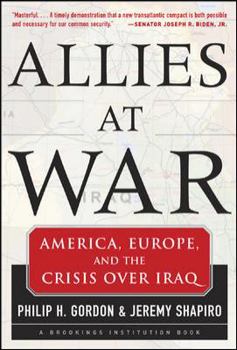Allies at War
Select Format
Select Condition 
Book Overview
A thorough analysis of where U.S./European relations have gone wrong--and how to set them right ALLIES AT WAR is the first and most comprehensive assessment of what went wrong between America and... This description may be from another edition of this product.
Format:Hardcover
Language:English
ISBN:0071441204
ISBN13:9780071441209
Release Date:April 2004
Publisher:McGraw-Hill Companies
Length:266 Pages
Weight:1.30 lbs.
Dimensions:1.1" x 6.2" x 9.3"
Customer Reviews
2 ratings
This is the best study yet of the transatlantic crisis over
Published by Thriftbooks.com User , 19 years ago
Iraq, well informed and eminently fair; it concludes with excellent advice, particularly regarding the need for Washington to continue supporting European integration and a collective European defense effort. What the authors make clear, without shrillness or grandstanding, is that "the European complaint that the American decision-making process and diplomacy about Iraq violated reasonable alliance norms and expectations is valid." They prove this point with careful analysis of what happened in 2002 and 2003 and with a short, sharp reminder of previous alliance crises and how they were overcome. This is not to say that the authors side with France and Germany; their criticism of those countries' diplomacy is often quite stinging. But the fact that the United States is the "indispensable power" does not mean that its allies must support it in every case. As Gordon and Shapiro write, "when taken too far, assertive leadership can quickly turn into arrogant unilateralism, to the point where resentful others become less likely to follow the lead of the United States." "Even a country as powerful as the United States," they explain, "needs a certain level of legitimacy and consent." And indeed, it is clear that U.S. rashness and roughness in its handling of Iraq has weakened its legitimacy and, as a result, badly damaged its interests.
Essential Reading to Inform Public Debate
Published by Thriftbooks.com User , 20 years ago
The importance of persistent conflict in Iraq throughout the 2004 presidential campaign makes this volume an essential contribution to the on-going public debate about the Bush Administration's foreign policy, particularly its global war on terrorism. Gordon and Shapiro carefully analyze the motivations and perceptions of the political elites on each continent as well as the opinions of their publics as the Iraq crisis unfolded. The initial chapters set the historical context for an analysis of the deepening discord within the Atlantic Alliance, which came to a head after September 11. The second part analyzes the sources of disagreement regarding Iraq and the reasons for divergence among the members in the transatlantic relationship. The final chapter makes several constructive recommendations to restore the Atlantic Alliance. These recommendations are particularly significant in light of findings reported after the book's publication. Recent confirmations question intelligence regarding Iraq's weapons of mass destruction (WMD) capability, notably the aluminum tubes cited as evidence that Saddam Hussein was rebuilding Iraq's nuclear weapons program. The fact that these aluminum tubes were likely intended for small artillery rockets, not nuclear use, necessitates a more comprehensive and critical public inquiry. There is an ethical imperative for the American public and the world to receive the information that allows citizens to question intelligently why military action was taken in Iraq. In light of the mounting casualties on all sides, this is a civic responsibility that speaks to America's founding as a republican government, not a reluctant empire. In question are the Bush Administration's doctrine of preventive war and its insistence on the need for regime change, not containment, in the Middle East. This volume underscores the Bush Administration's reliance on military action to rid the region of terrorists. The fact that this reliance occurs without a steadfast pursuit of Middle East peace through a US commitment to the Road Map defies a basic premise of The 9/11 Commission Report's findings. The Report emphasizes that a global strategy to protect the nation should be a balanced one that uses all elements of national power, including diplomacy, intelligence and education to reach out to the larger Muslim world. Perhaps the most relevant aspect of this case study analysis is the explanation of allied differences. The American faith in precision technology and military prowess is contrasted with the European willingness to accept, contain and try to deter the threat Iraq represented under the dictatorial leadership of Saddam Hussein. More fundamentally, Europe's, and particularly Germany's, awareness of historical mistakes in the rush to militarism is opposed by an increasing American proclivity to accept military force as just another tool in its global strategy against terrorism. This difference brings to mind the influence of the Bu





